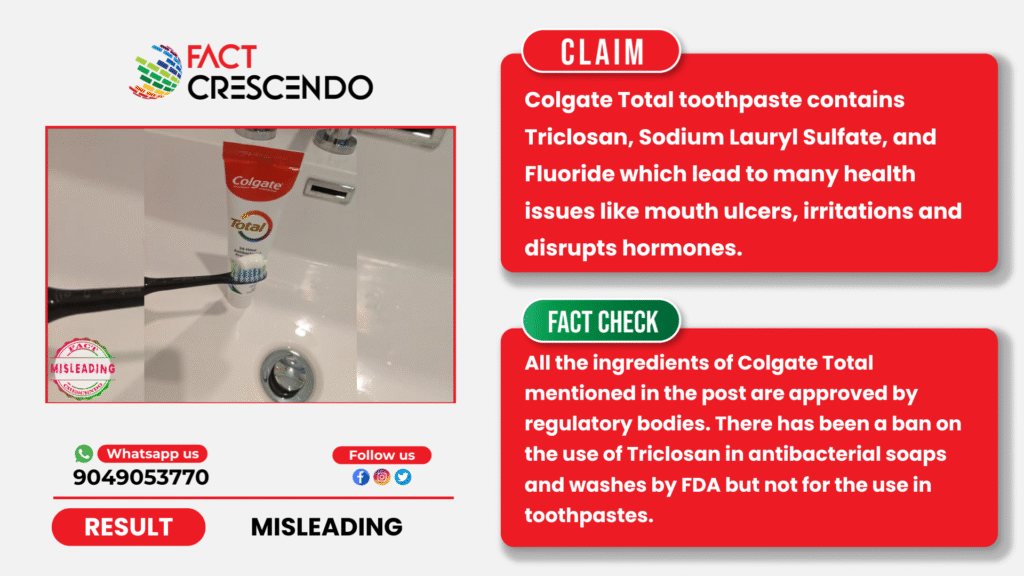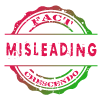
Colgate Total is a well-known brand and found in many households from many years. Over the years, people have shown their trust in the product and the same has found place in the consumer’s family. It is an anti-bacterial toothpaste that fights germs for 12 hours on teeth, cheeks and gums.
But recently, people have raised their concerns on the use of some ingredients like Sodium Lauryl Sulfate (SLS), Artificial sweeteners and dyes, Fluoride and Triclosan in the product. They claim that these ingredients are not safe for human use and lead to many health problems.
However, Fact Crescendo found the claim to be misleading. All the ingredients mentioned in the post are safe when used in toothpastes. These ingredients are used in many products except Triclosan which is majorly used in toothpastes only.
What’s the claim?
Social media users are claiming that Colgate Total contains ingredients like Sodium Lauryl Sulfate (SLS), Artificial sweeteners and dyes, Fluoride and Triclosan which lead to many health issues like mouth ulcers, irritations, disrupts hormones and many more.
Fact Check-
In 1997, the U.S. Food and Drug Administration (FDA) officially approved the sale of Colgate Total toothpaste in the United States. This approval meant that the toothpaste met the FDA’s high standards for safety, effectiveness, and quality in fighting common oral health problems like plaque and gingivitis. Colgate Total became the first and only toothpaste in the U.S. approved to help prevent gingivitis for its unique triclosan-copolymer formula. Independent dental associations in 30 countries, including the American, Canadian and British Dental Associations, have granted seals of acceptance to Colgate Total.
According to another report, in December 2017, a social media post wrongly claimed the FDA had banned triclosan in toothpaste and suggested products like Colgate Total should be immediately thrown away. But, the FDA had banned Triclosan in antibacterial soaps and washes and not toothpastes. The use of the ingredient in toothpastes was approved by the FDA in 1997 and continues to be considered safe and effective when used properly.
It is true that there are still concerns about triclosan’s potential environmental and health effects but safety authority bodies and Colgate-Palmolive confirmed that the benefits of triclosan in toothpaste outweigh the risks.
Let’s look at each ingredient mentioned in the post.
Triclosan:
The European scientific committee (SCCS) considers Triclosan safe for use in certain cosmetic products when used within specific limits. In toothpaste, it is safe at a concentration of 0.3% for both adults and children aged 6 months to 18 years, but not safe for children under 3 years if combined with other similar ingredients. In mouthwash, it is safe for adults at a concentration of 0.2% when used alone, but not safe for children or adolescents at that same level, even when used individually. The use of triclosan in body lotions may pose risks if combined with other products containing the ingredient.
Molecular Diversity Preservation International (MDPI) report states that toothpastes containing triclosan (TCS) when combined with fluoride and a copolymer resulted in reducing plaque, gingivitis, bleeding, and harmful oral bacteria better than fluoride-only toothpastes. These benefits are useful for people with or at risk of gum disease (like periodontitis). Colgate Total containing 0.3% TCS, 0.24% fluoride, and a copolymer, has shown better performance in maintaining oral health, reducing inflammation, and preventing disease progression. Studies have also explored advanced delivery systems like triclosan-chitosan and triclosan in nanogels, showing promise in further reducing gum inflammation and fighting bacteria. Overall, triclosan-containing toothpastes are more effective than standard ones in improving and maintaining oral and gum health.
According to the National Institute of Health (NIH), toothpaste with triclosan and a copolymer, along with fluoride can help reduce plaque, gum inflammation, and gum bleeding better than regular fluoride toothpaste. Strong evidence shows that this type of toothpaste slightly reduces tooth decay on the crown of the tooth. There is weaker evidence that it might help with root decay and tartar buildup, but not enough proof that it prevents gum disease (periodontitis). Overall, no serious safety issues were found in people who used these toothpastes for up to three years.
Sodium Lauryl Sulfate (SLS):
Sodium Lauryl Sulfate is used as an ingredient in many cosmetics, cleaners, toothpastes etc. It’s a very common ingredient used to create foam for deeper cleaning. This foam makes it easier to break down and wash away plaque and other particles.
Groups like FDA and EPA studied SLS and the risk it might pose to people, especially children. It declared SLS as safe and non-carcinogen. However, people with mouth sores may find SLS toothpaste causes more irritation, so using toothpaste without SLS can help reduce pain. When used correctly, SLS is safe. The FDA considers SLS as Generally Recognized as Safe (GRAS) and allows it to be used in foods in small quantities.
FAQs on SLS can be read here.
Fluoride:
According to the India Dental Association (IDA), Fluoride toothpaste helps prevent tooth decay by strengthening tooth enamel and repairing early damage. Fluoride works by making enamel more resistant to acid, helping rebuild lost minerals, and reducing harmful bacteria in the mouth. Brushing twice a day with fluoride toothpaste is more effective than brushing once, especially when done in the morning and at night.
A review showed that fluoride toothpaste works better than non-fluoride toothpaste in preventing tooth decay. There is some evidence that higher fluoride levels may protect teeth more, especially in children and teens but there is no confirmation to it yet. More studies are needed to be sure about how much fluoride levels will be more effective and what will be its effects.
Conclusion:
Fact Crescendo found the claim to be misleading. All the ingredients of Colgate Total mentioned in the post are approved by regulatory bodies. There has been a ban on the use of Triclosan in antibacterial soaps and washes by FDA but not for the use in toothpastes.

Title:Colgate Total Ingredients Meet All Regulatory Standards: Confirm Safety Authorities
Fact Check By: Drabanti GhoshResult: Misleading


